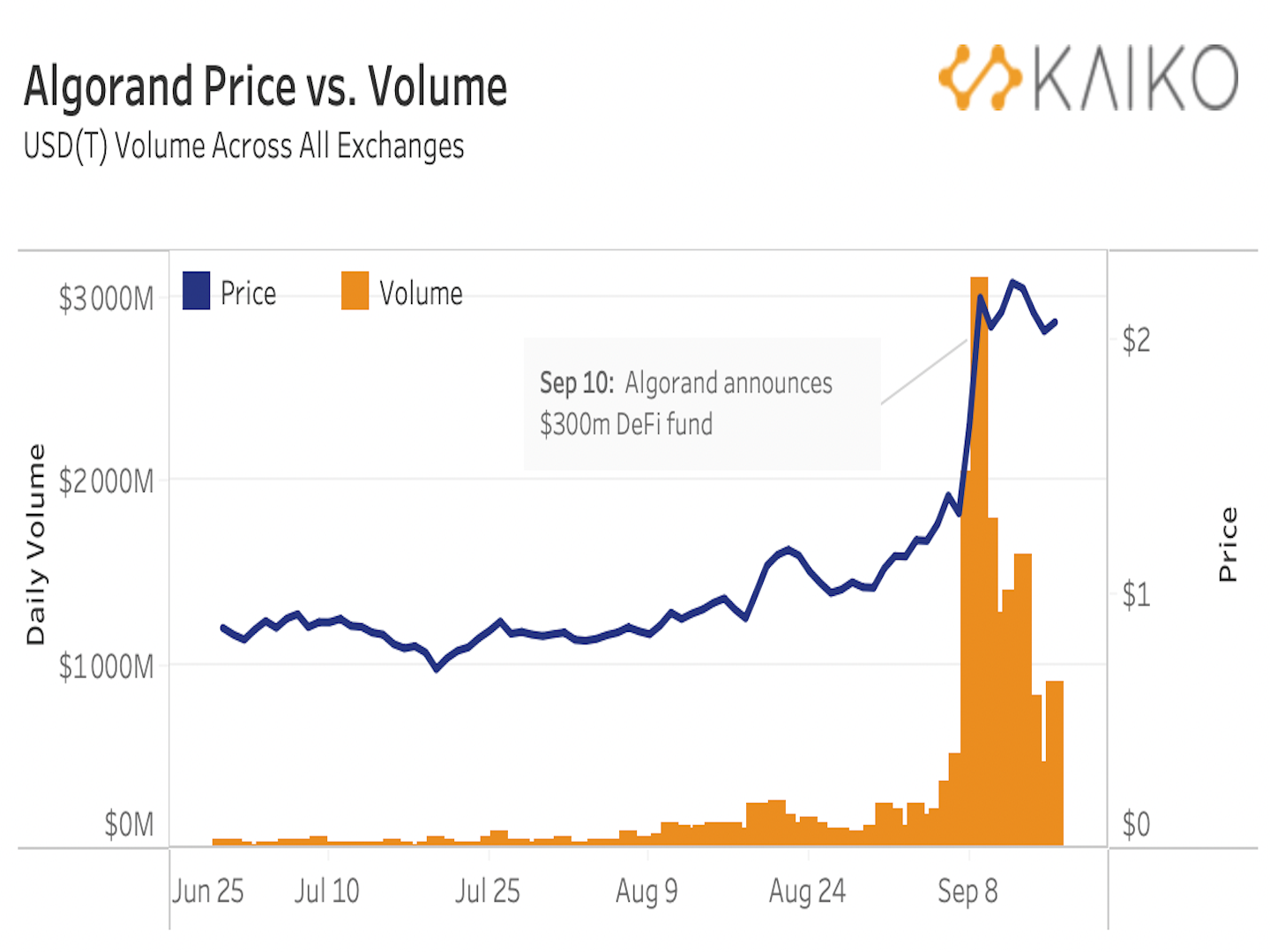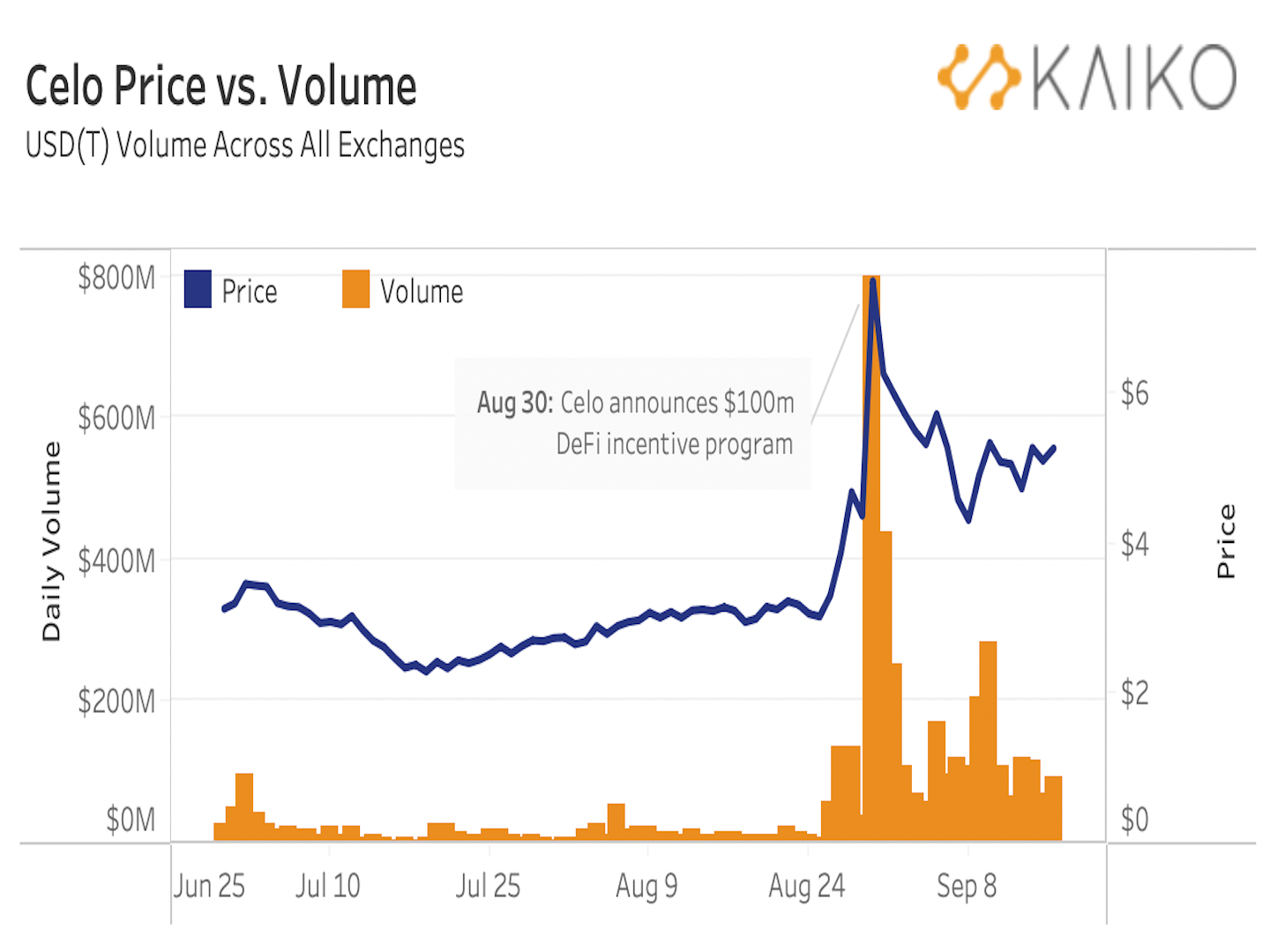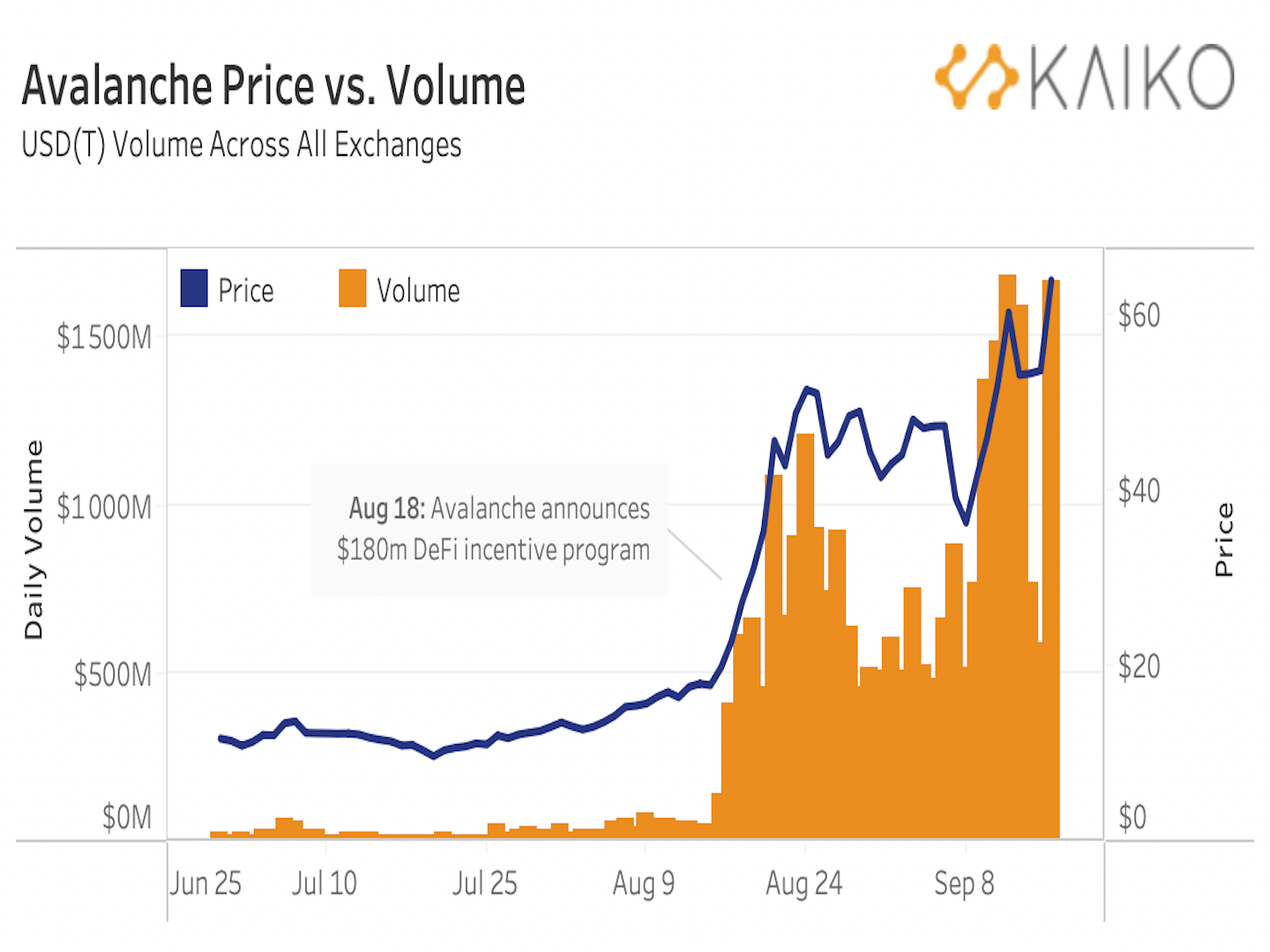“Buy the rumor, sell the news.” It is not surprising when a token sees a price pop after its underlying blockchain announces a multimillion-dollar program to attract new users.
But in the case for some popular tokens of layer 1 blockchains, the price pumps were premature: Trading data shows that both volume and prices for some tokens started going up a few days before incentives were announced, raising questions on whether some insiders were front-running the news.
Team members from these projects denied the possibility of insider trading, but for an industry that tries to eradicate financial inequality, the pre-event price pump can shake some investors’ faith in crypto.
“Digital assets operate like a frontier economy where rules and regulations are still being developed,” Jesse Proudman, CEO and co-founder of crypto robo-advisor Makara, said. “Insider trading, long established as illegal in established markets, is often celebrated in these markets.”
Days before blockchains Celo, Avalanche and Algorand announced major incentive programs, trading volumes across all centralized exchanges for their respective tokens were rising steadily, as were their prices, according to data compiled by the crypto analysts at Kaiko.
For example, before Algorand announced its $300 million decentralized finance (DeFi) fund on Sept. 10, the price of its token ALGO had been climbing for a few days – this positive growth in pricing was also little affected by a broader market sell-off at the time.

(Kaiko)
Similar moves happened to Celo and Avalanche as well.

(Kaiko)

(Kaiko)
“The charts for those cryptos mentioned certainly suggest significant buying immediately prior to public announcements,” Rick Delaney, senior analyst at OKEx Insights, said. “The most logical conclusion is that those closest to the deals or partnerships front-ran the announcements.”
Representatives from Celo and Algorand declined to comment on token prices, but said various news events leading up to their incentive announcements had generated increased excitement and confidence among token holders.
“Celo has no insight into who is trading and for what reasons,” a representative for Celo wrote in an email. “A number of major announcements led up to that point,” the person said, including a tweet by data site Defi Llama that it started tracking a decentralized exchange on Celo.
Algorand representatives sounded a similar note.
“While we don’t generally speculate on the reason for price movements of the ALGO token, we want to point out that the launch of the Viridis DeFi fund was one of a number of significant events that occurred in a very dynamic late August and early September for the Algorand ecosystem,” Stephen Duignan, head of marketing at the Algorand Foundation, said through a representative.
By press time, Ava Labs, the company that builds Avalanche, did not respond to CoinDesk’s requests for comment.
Inside the data
According to some sources who spoke to CoinDesk on the subject, it is still possible that insider trading was involved in the pre-event price pump.
All three blockchains, Celo, Avalanche and Algorand, have their own blockchain explorers that, in theory, allow anyone to search for any on-chain transactions. Thanks to that, blockchain analysis firm Crystal Blockchain found that at least on Celo and Avalanche, the on-chain transactions spiked just a day before their official announcements.
On Celo, for example, the total number of transactions spiked on Aug. 24, one day before Celo’s announcement, which was similar to the number of transactions on Aug. 25, according to Scott Pounder, head of investigations at Crystal. The firm was not able to analyze Algorand’s data because its blockchain explorer does not provide filters to sort data by time frames.
“These organizations try to keep price-affecting news confidential before release, but as with all organizations, it’s possible that insiders do trade confidential information or it’s leaked to other people that do,” Andrew Kang, co-founder of crypto investment firm Mechanism Capital, told CoinDesk.
Big picture
Crypto has a total market capitalization of about $2 trillion (versus $11 trillion for gold); therefore, the value of most cryptocurrencies is small enough that their prices can be more vulnerable to potential price manipulation.
“When seeking to invest in digital assets, people should always do their homework and understand the risks involved, as they can be far more volatile than traditional assets,” Makara’s Proudman said.
According to Chen Arad, chief operating officer at crypto risk monitoring firm Solidus Labs, the lack of market surveillance solutions has invited “common manipulative schemes like pump and dump, insider trading, wash-trading.” He estimated that at least 85% crypto platforms have not deployed any market surveillance tools.
On the other hand
But some argue that with all the excitement around layer 1 blockchains, it is also possible the pre-event price pumps occurred because investors are betting on the next hot layer 1 after witnessing the huge success of Solana and Terra (and Bitcoin and Ethereum before them).
“It looks like in the last few weeks there’s been a sort of rotation in every top layer 1 or even secondary layer 1 with some significant price move at some point,” Jake Dwyer, managing director and head of DeFi at crypto market maker GSR, said. “If you look over the last month and a half, you just see really aggressive price action on each of them.”
Avi Felman, co-portfolio manager at crypto investment firm BlockTower Capital, said Avalanche was among the first projects to deploy the incentive playbook, which was followed by many other competitors.
“And once [Avalanche] started the program, I think a lot of people realized that coins with big treasuries could also pull the same stunt, so piled in,” Felman said of the $180 million “Avalanche Rush” program. A pioneer in the approach is Binance Smart Chain (BSC), which announced a $100 million fund for DeFi projects on BSC back in September 2020.
According to Messari’s second-quarter report on layer 1 projects in July, the effect of Ethereum’s rising transaction fees has forced many developers and traders to look for cheaper and faster alternatives. While many base layers claim to provide faster and cheaper transactions, the prospect of juiced token returns has become one of the more efficient ways to attract Ethereum users.
“There is a lot of money from traders trying to find the next narrative or big layer 1 play,” said Mechanism’s Kang.
DISCLOSURE
Please note that our privacy policy, terms of use, cookies, and do not sell my personal information has been updated.
The leader in news and information on cryptocurrency, digital assets and the future of money, CoinDesk is a media outlet that strives for the highest journalistic standards and abides by a strict set of editorial policies. CoinDesk is an independent operating subsidiary of Digital Currency Group, which invests in cryptocurrencies and blockchain startups. As part of their compensation, certain CoinDesk employees, including editorial employees, may receive exposure to DCG equity in the form of stock appreciation rights, which vest over a multi-year period. CoinDesk journalists are not allowed to purchase stock outright in DCG.

:format(jpg)/cloudfront-us-east-1.images.arcpublishing.com/coindesk/55RYNZNKY5BG7D2CDX7FQQCEIY.jpg)
:format(jpg)/cloudfront-us-east-1.images.arcpublishing.com/coindesk/PFEHNV7HU5CCPFROJKQIPWNYJU.jpg)
:format(jpg)/cloudfront-us-east-1.images.arcpublishing.com/coindesk/YLVK7NL7PJAVRJVREC7DTR6XME.jpg)
:format(jpg)/cloudfront-us-east-1.images.arcpublishing.com/coindesk/EXPOIBREMFHSHA7CVOGJ5TDWUY.jpg)
:format(jpg)/cloudfront-us-east-1.images.arcpublishing.com/coindesk/PJTR3KRDWJCRVE3QREM6KUOK7A.png)